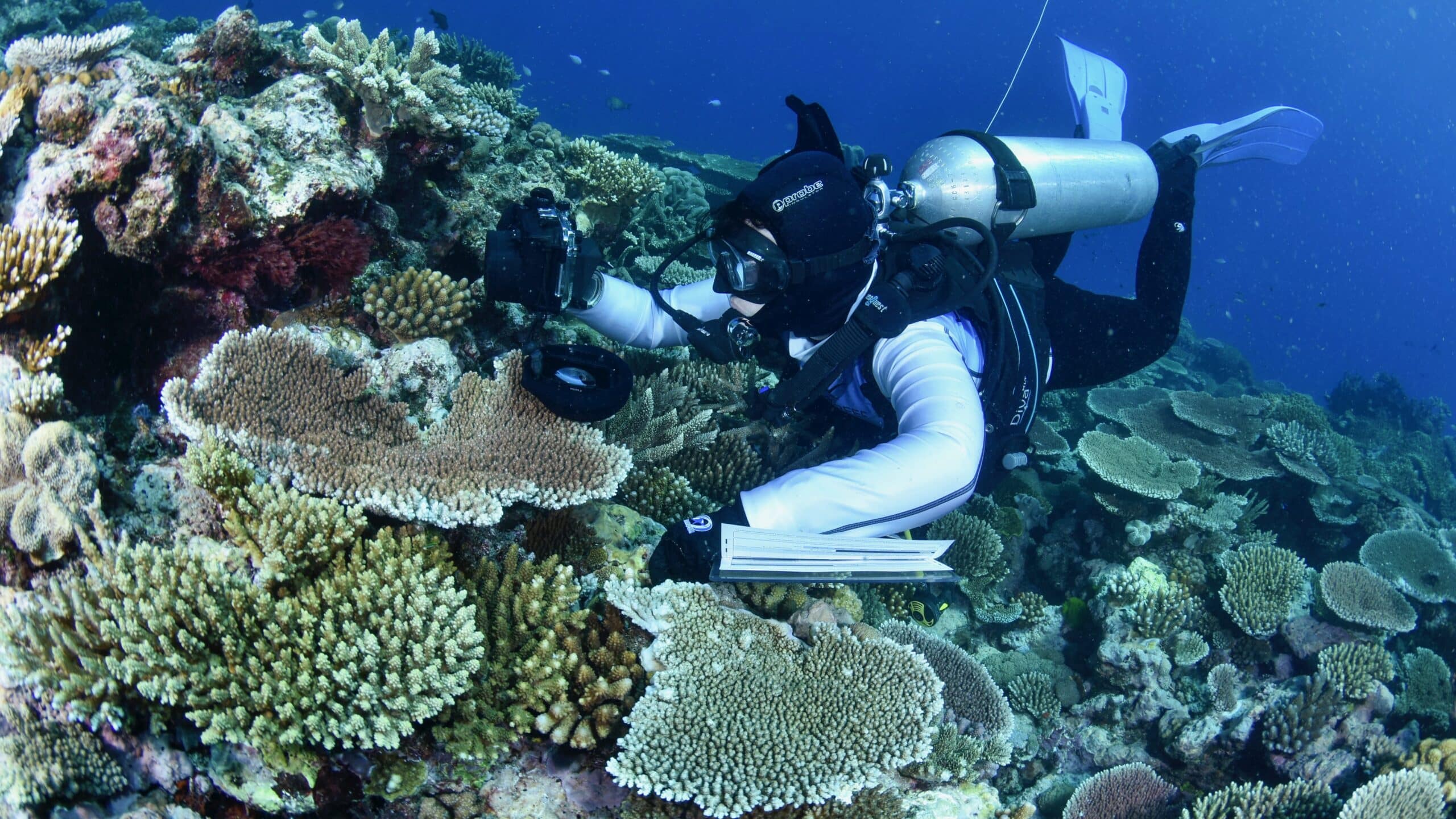The Great Barrier Reef isn’t just an endangered world wonder. Protecting the world’s largest coral reef system is also key to Australia’s economic growth.

A diver swims past coral on the Great Barrier Reef in Australia, 18 October 2016. More than 90% of Great Barrier Reef coral surveyed in 2022 was bleached in the fourth such mass event in seven years in the world’s largest coral reef ecosystem. (M. Curnock/GBRMPA via AP)
For the first time in Australian history, a new coal mine has just been blocked by the national government under federal environment laws.
The planned open cut mine in the state of Queensland was just 10 kilometres from the Great Barrier Reef, a world heritage area.
Citing unacceptable risks from the mine to ground water and freshwater creeks which flow into the Reef, the Australian government decision in early February is the first ever refusal of a coal mine development under Australia’s Environment Protection and Biodiversity Conservation (EPBC) Act, which was introduced in 1999.
The Great Barrier Reef is a great global asset
The move to protect the country’s internationally-renowned tourist destination was based on environmental risk factors, but it highlights why the economic value of Australia’s vast natural assets is being more closely looked at than ever before.
The Great Barrier Reef is the largest living structure on Earth and makes up about 10% of the world’s coral reef ecosystems. Spanning 2,300 kilometres, it’s the size of Japan, and bigger than the United Kingdom, Switzerland and the Netherlands put together.
Rising temperatures on land and in the oceans, caused primarily by an increase of carbon dioxide and other greenhouse gases, have triggered four mass coral bleaching events on the Reef in just seven years, reducing shallow water coral reefs by as much as 50%.
An increase in severe weather events has also caused significant damage to the reef, while greater ocean acidification because of higher atmospheric CO2 has impacted marine habitats all along the reef.
The Australian government considers climate change to be the single biggest threat to the Great Barrier Reef. In 2022 it announced plans to invest a record A$1.2 billion to protect and build the resilience of the Reef.
The economic value of environmental protection
A report by Deloitte Access Economics, a research and analysis arm of the international financial firm, found that the Great Barrier Reef contributes A$6.4 billion each year to the Australian economy and supports tens of thousands of jobs.
Most of those jobs are in tourism. But there are also important economic contributions from fishing, recreational and scientific activities.
The small tropical city of Cairns in north Queensland, population of around 150,000, is a key gateway for Reef tours, with an international airport as well as facilities for massive cruise ships near the town centre.
Deloitte also estimates the value of the Great Barrier Reef as an Australian economic, social and iconic asset is A$56 billion.
Around A$29 billion of this value is in tourists who have been to the Reef, and another A$24 billion is accounted for by those who have not yet visited but value knowing such a unique global asset exists.
The remaining A$3 billion in value is made up of recreational users — Australians going to the beach, taking the boat out and diving on weekends.
“The significance of the Great Barrier Reef’s contribution to the Australian economy, to Australian jobs and its remarkable asset value, strongly indicates the Reef should be given even greater priority by all citizens, businesses and levels of government,” the report said.
Accounting for natural capital
Consulting firm KPMG says it’s vital to value nature because not considering the full costs of human activity on an environmental asset is a market failure which has practical, real-world effects.
In a report last year, KPMG Senior Economist Dr. Sarah Hunter said the coral bleaching on the Barrier Reef and the resulting loss of ecosystems could negatively impact the economy because the Reef protects local communities from storms and erosion and is a direct generator of jobs.
“Fully recognising the value of these nature-based services is therefore vital,” Hunter said.
Not just recognising but accurately accounting for the economic value of Australia’s natural capital— whether land, or wildlife, or the Great Barrier Reef — is the next step.
Former head of the Australian Treasury, Ken Henry, is a leading advocate of “national environmental accounting” of Australia’s natural capital, and says it should be incorporated into all levels of decision-making.
By developing a baseline dataset in a particular region, auditing everything from flora and fauna to quality of soil and waterways, scientists can track changes in the natural environment to see if it’s degrading or improving.
This lays the foundation for new markets that attach a financial value to improving environmental conditions, which incentivises more businesses to invest — not just because it’s the right thing to do but because it’s the profitable thing to do.
Three questions to consider:
- What gives the Great Barrier Reef its value?
- How should we account for the value of natural assets?
- How would a more accurate economic valuation of environmental assets help protect them for future generations?

Richard Hubbard is a finance and economics journalist with more than 35 years reporting from Australia, the UK, Asia and the United States. He is currently a freelance journalist based in Sydney. Hubbard covered the Asian financial crisis of the late 1990s from Hong Kong and Singapore, and later the run-up to the 2008 financial crisis and its aftermath from London.
